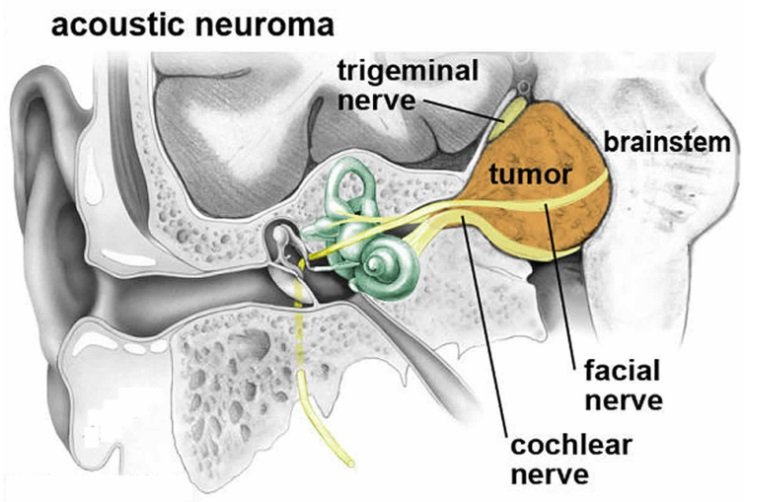Understanding Acoustic Neuroma: Causes, Symptoms, and Diagnosis | Comprehensive Guide- Acoustic neuroma, also known as vestibular schwannoma, is a benign tumor that develops on the vestibulocochlear nerve, affecting the balance and hearing functions. While often slow-growing, it can lead to significant complications if left untreated. Let’s delve into the details of this condition and shed light on its management.
Table of Contents
ToggleUnderstanding Acoustic Neuroma: Causes, Symptoms, and Diagnosis | Comprehensive Guide

Summary
Acoustic neuroma, a non-cancerous tumor on the vestibulocochlear nerve, can significantly impact one’s auditory and neurological health. Understanding its causes, symptoms, and diagnosis is crucial for timely intervention. This article explores the key aspects of acoustic neuroma, from its underlying causes to available treatments, offering insights to empower individuals facing this condition.
Causes
The exact cause of acoustic neuroma remains largely unknown. However, certain factors may contribute to its development, including genetic predisposition, such as malfunctioning genes on chromosome 22. Additionally, individuals with neurofibromatosis type II or those exposed to high-dose ionizing radiation may face an increased risk.
Symptoms:
Acoustic neuroma symptoms typically manifest gradually and may include unilateral hearing loss, tinnitus (ringing in the affected ear), dizziness, loss of balance, and facial numbness. These symptoms, though subtle initially, can significantly impact daily life and warrant prompt medical attention.
Diagnosis
Diagnosing acoustic neuroma involves a comprehensive evaluation by a medical professional. Common diagnostic methods include audiometry to assess hearing ability, CT scan to visualize the tumor’s size and location, and MRI to confirm its presence. Physical examination, blood tests, urine tests, and ultrasound may also aid in the diagnostic process.
Treatments
Treatment strategies for acoustic neuroma vary based on the tumor’s size, symptoms, and the patient’s overall health. For small, asymptomatic tumors, a “watch-and-wait” approach may be recommended, with periodic monitoring through imaging and hearing tests. In severe cases or when symptoms become debilitating, surgical intervention or radiation therapy may be necessary to remove or shrink the tumor.
Surgery
Surgical removal of the acoustic neuroma aims to alleviate symptoms and prevent further complications. Depending on the tumor’s size and location, different surgical approaches, such as trans labyrinthine, retro sigmoid, or middle fossa, may be utilized. While surgery carries risks, including facial nerve damage and hearing loss, it can provide long-term relief for many patients.
Complications
Complications of untreated or advanced acoustic neuroma may include facial muscle weakness, balance disorders, and hydrocephalus (fluid buildup in the brain). Timely diagnosis and appropriate management are essential to mitigate these potential complications and improve patient outcomes.
Prevention
While it’s not always possible to prevent acoustic neuroma, individuals with a family history of the condition or those with known risk factors should undergo regular screenings and adopt a healthy lifestyle. Avoiding exposure to high-dose radiation and seeking prompt medical attention for any concerning symptoms can also help reduce the risk.
Questions To Ask Your Doctor
- What are some self-care measures I can take to manage my symptoms?
- Are there any restrictions I need to follow during treatment?
- How long does it typically take to recover from surgery or other interventions?
- What are the potential side effects of treatment, and how can they be managed?
Conclusion
Acoustic neuroma, though rare, can significantly impact an individual’s quality of life. By understanding its causes, recognizing its symptoms, and seeking timely medical intervention, individuals can effectively manage this condition and minimize its impact on their daily lives. With advancements in diagnostic techniques and treatment modalities, there is hope for improved outcomes and better quality of life for those affected by acoustic neuroma.
FAQs:
Q: Is acoustic neuroma cancerous? A: No, acoustic neuroma is a benign tumor, meaning it’s non-cancerous.
Q: Can acoustic neuroma cause permanent hearing loss? A: Yes, if left untreated, acoustic neuroma can lead to permanent hearing loss in the affected ear.
Q: Are there any alternative treatments for acoustic neuroma? A: While surgery and radiation therapy are the primary treatment options, some individuals may explore alternative therapies such as acupuncture or dietary supplements. However, it’s essential to discuss these options with a healthcare professional before pursuing them.
Q: Can acoustic neuroma recur after treatment? A: While rare, acoustic neuroma can recur following treatment. Regular follow-up appointments and monitoring are essential to detect any recurrence early and initiate appropriate management.
Q: How common is acoustic neuroma? A: Acoustic neuroma is relatively rare, with an estimated incidence of 1 in 100,000 individuals per year. However, its prevalence may be higher due to improved diagnostic techniques and increased awareness.
Q: Can acoustic neuroma be detected through routine screenings? A: Routine screenings for acoustic neuroma are not typically conducted in the general population. However, individuals with a family history of the condition or those with known risk factors may benefit from regular screenings, including hearing tests and imaging studies.
Q: Is it possible to live a normal life with acoustic neuroma? A: With appropriate management and treatment, many individuals with acoustic neuroma can lead fulfilling lives. However, the impact of the condition may vary depending on its size, symptoms, and response to treatment. Close collaboration with healthcare providers and adherence to treatment plans can help optimize outcomes and quality of life.
Q: Are there support groups available for individuals with acoustic neuroma? A: Yes, there are several support groups and online communities dedicated to individuals affected by acoustic neuroma. These groups offer resources, information, and peer support, allowing individuals to connect with others facing similar challenges and share experiences.
Q: Can acoustic neuroma affect children? A: While acoustic neuroma is more commonly diagnosed in adults aged 30-60 years, it can occur in children, albeit less frequently. Pediatric cases of acoustic neuroma may present unique challenges in diagnosis and management, requiring specialized care from healthcare professionals experienced in treating pediatric neurologic conditions.
ALSO READ- Acne
